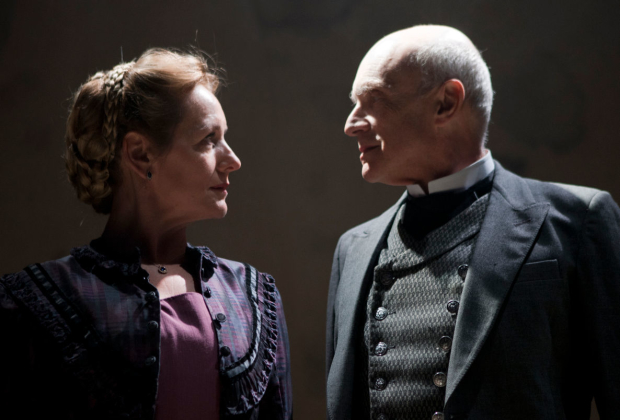Lady Anna: All At Sea (Park Theatre)
A new adaptation of Anthony Trollope’s novel goes overboard

© Simon Annand
With The Pallisers, the Barsetshire Chronicles, The Way We Live Now and others, the Victorian novelist Anthony Trollope has been staple fare on television for years – it's no surprise at all that Julian Fellowes, author of Downton Abbey, is currently adapting Doctor Thorne in three parts – but never, like Dickens, popular in the theatre.
The Trollope Society has attempted to put that right in the novelist's bicentenary year with this commission – playwright Craig Baxter, director Colin Blumenau – to adapt Lady Anna (1871) which Trollope wrote on board a ship to Australia where he and his wife, Rose, were visiting their sheep farmer son in New South Wales.
The idea is to mesh the domestic details of the Trollope marriage with the dilemma of Lady Anna, a rich heiress who loves a Yorkshire tailor's son but is being steered towards marrying her more "suitable" cousin, Frederick Lovel, by her ambitious but impoverished mother, Lady Lovel; the novel ends with the newlyweds emigrating to Australia, the classless New World of opportunity and freedom.
The trouble is, once Anna's dilemma is stated, that's it, save for a couple of melodramatic outbursts in the London courts – which sit uneasily with the on-board scenes and the heavy-handed animations of the Trollope marriage – and the writer's habit of giving his morning's work (nine pages a day before breakfast, always) to their maid, who is played by Lady Anna, aka Antonia Kinlay.
There's nothing much made of this doubling, any more than there is of blustery, mutton-chopped Tim Frances extending his likeness of the novelist into sketches of the arbitrating solicitor general as Frederick (Adam Scott-Rowley) pleads his case for the disputed inheritance and of Thomas Thwaite, the tailor, who supported Lady Lovel (Caroline Langrishe, also Mrs Trollope) and her daughter in their early years of struggle; the belted earl had bolted to another wife in Italy.
The conceit of Trollope writing the book as we go is conveyed in Libby Watson's design of pastel-coloured tomes littering the stage and acting as platforms, chairs, even stepping stones at Bolton Abbey in Wharfedale. But the story keeps tripping up on the sort of "third person narrative" tricks that only the best directors can pull off.
Also, the framework isn't strong, or interesting, enough to justify the meshing in the first place. It results in something more like "mushing," although I did quite like Langrishe branding her own daughter "an impertinent slut" when told of her decision (for the umpteenth time) to marry the young drippy Daniel (a willowy, likeable Will Rastall) and then turning to the audience to reassure us that the phrase is in Trollope.
Another thing: Trollope sets his novel forty years earlier, at the time of the 1832 Reform Act, so there's a strain of political radicalism colouring the relationship of the Thwaites and the Lovels, and that's all gone overboard, too.
Lady Anna: All at Sea continues at Park Theatre until 19 September












